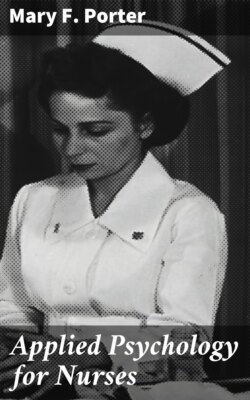Читать книгу Applied Psychology for Nurses - Mary F. Porter - Страница 20
На сайте Литреса книга снята с продажи.
CHAPTER II
CONSCIOUSNESS
ОглавлениеTable of Contents
We took a glimpse at random into the mental life of an adult consciousness, and found it very complicated, constantly changing. We found it packed with shifting material, which, on the surface, seemed to bear very little relation. We found reason, feeling, and will all interacting. We found nothing to indicate that a consciousness as simple as mere awareness might exist. We believe there might be such in the newborn babe, perhaps even in the baby a month old; but can we prove it? Let us look within again and see if there are not times of mere, bare consciousness in our own experience that give us the proof we need.
I have slept deeply all night. It is my usual waking time. Something from within or from without forces an impression upon my mind, and I stir, and slowly open my eyes. As yet I have really not seen anything. With my eyes open my mind still sleeps—but in a few seconds comes a possessing sense of well-being. Obeying some stimulus, not recognized by the senses as yet, I begin to stretch and yawn, then close my eyes and settle down into my pillows as for another nap. I am not aware that I am I, that I am awake, that I have yawned and stretched. I have a pleasant, half-dreamy feeling, but could not give it a name. For those few seconds this is all my world—a pleasant drowsiness, a being possessed by comfort. My consciousness is mere awareness—a pleasant awareness of uncomplicated existence. In another moment or two it is a consciousness of a day’s work or pleasure ahead, the necessity of rising, dressing, planning the day, the alert reaction of pleasure or displeasure to what it is to bring, the effort to recall the dreams of sleep—the complicated consciousness of the mature man or woman. But I started the day with a mental condition close to pure sensation, a vague feeling of something different than what was just before.
Or this bare consciousness may come in the moment of acute shock, when the sense of suffering, quite disconnected from its cause, pervades my entire being; or at the second when I am first “coming back” after a faint, or at the first stepping out from an anesthetic. In these experiences most of us can recall a very simple mental content, and can prove to our own satisfaction that there is such a thing as mere awareness, a consciousness probably close akin to that of the lower levels of animal life, or to that of the newborn babe when he first opens his eyes to life.
Consciousness, then, in its elements, is the simplest mental reaction to what the senses bring.
How shall we determine when consciousness exists? What are its tests?
The response of the mind to stimuli, made evident by the body’s reaction, gives the proof of consciousness in man or lower animal.
But what do we mean by a stimulus?
Light stimulates me to close my eyes when first entering its glare from a dark room, or to open them when it plays upon my eyelids as I sleep and the morning sun reaches me. It is a stimulus from without.
The fear-thought, which makes my body tremble, my pupils grow wide, and whitens my cheeks, is a stimulus from within.
An unexpected shot in the woods near-by, which changes the whole trend of my thinking and startles me into investigating its cause, is a stimulus from without causing a change within.
A stimulus, then, is anything within or without the body that arouses awareness; and this is usually evidenced by some physical change, however slight—perhaps only by dilated pupils or an expression of relief. When we see the reaction of the body to the stimulus we know there is consciousness. On the other hand, we cannot say that consciousness is always absent when the usual response does not occur; for there may be injury to organs accounting for the lack of visible reaction, while the mind itself may respond. But with due care, in even such cases, some external symptoms of response can usually be found if consciousness exists.
We have already realized how complex, intricate, and changing is fully developed consciousness.
